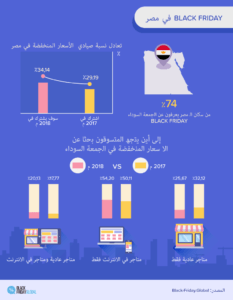Black Friday, White Friday, Cyber Monday, Singles’ Day, the 11.11 sale; all these names carry the promise of massive discounts that make us feel like the most ambitious of our materialistic dreams could come true.
Even in Egypt, people flock from mall to mall and rummage hurriedly through the websites of e-commerce giants like Souq.com and Jumia to try and get their hands on the ‘best deals’. AIESEC, the world’s largest non-profit youth-run organization, offered their Egyptian audience special Black Friday deals too.
Any organization, however, will obviously only indulge in cutting prices because they’ve calculated it would be good for them. But, are they always good for us?
Let’s ditch the tired history lessons on the origins of their names and run through what could help us avoid the possible dangers of yielding our minds to the allure of seemingly ever-shrinking prices before the sale party is over.
1. The big items on low prices and decision fatigue
Big items, like top-notch TVs, can be found advertised at ridiculously low prices. How are retail giants doing it without losing money? Well, partly because they assume you won’t just buy the TV. What’s a TV good for without an HDMI cable or a wall-mount kit? The stores are usually stuffed with products left and right that are priced at normal, high-margin levels. And the persuasive architecture of its environment is designed to compel you into buying as many of them as possible so that by the time you’ve left the store, you will have given it a lot more than you’ve saved on that screen.

Via Black Friday Global
It hence goes without saying that making a shopping list with a limited allocated budget and sticking to it (which of course requires a considerable degree of self-discipline) is essential. Browsing on Black Friday is dangerous.
Creating a shopping list will also help you dodge the consequences of decision fatigue. Making so many decisions about what to buy in a few days could consume your good judgment and push you into buying what only feels cheap as you near the end of your treasure hunt.
2. The limited quantities trick
You may find discounted items that the retailer claims to be in limited quantities and running out of stock, but that may not be the case. Perhaps that’s how much they could sell without making losses, but what if it is merely a marketing trick aimed at getting you to make irrational decisions by inducing in you a fear of missing out?
That’s why doing your research on those products to find out where and at what prices they exist throughout the year is worthwhile. As seductive as it may seem, the deals on these items you know nothing about are quite risky.
3. The brain is untrustworthy on discount days
In a 2007 paper entitled “Neural Predictors of Purchases,” researchers made some observations on the shopper within us all and they were rather embarrassing.

Via Cairo Festival City Mall
Through FMRI brain scanning, they discovered that the part of the brain we use when making decisions went crazy on noticing prices we perceive as lower than expected. The insula (the pain-registering part), on the other hand, responded fiercely when seeing prices that are higher than we expect. This brain activity had a strong correlation to whether or not the shoppers ended up buying the products or not. Whether through scientific research or experience, marketers realize this, and they will throw their best punches on all those exciting days. Being aware of this would hopefully make it easier for you to toss away your first impressions of a deal.
4. The sunk cost fallacy
“The sunk cost effect is the general tendency for people to continue an endeavor, or continue consuming or pursuing an option. If they’ve invested time or money or some resource in it, that effect becomes a fallacy if it’s pushing you to do things that are making you unhappy or worse off,” said Christopher Olivola, an assistant professor of marketing at Carnegie Mellon’s Tepper School of Business and the author of a paper on the topic published in the journal Psychological Science to Time magazine.
The paper explores committing to things that are no longer profitable or beneficial to us because we’ve invested a lot in them.
This fallacy makes us inclined to keep shopping on a Black Friday even if it is no longer fruitful. You’ve been through crowded roads, crossed through a sea of people, your legs grew sore from waiting in lines, and this doesn’t happen except once a year. After all this, you may feel encouraged to ignore advice from anyone including yourself and indulge in buying whatever comes before your hands and under your credit card balance.
5. The costs omitted from shopping receipts
Finally, let us put the the cost-benefit analysis of purchases, the marketing tricks, and the shortcomings of our decision-making processes aside for a second. What else are you spending?

Via Aimera
You’re spending a great deal of your time, transportation fees, and higher-than-usual parking fees if you’ve ventured into a mall with your car. If you’ve factored in how you value your time and what you’re planning to buy, is it worth it?



























